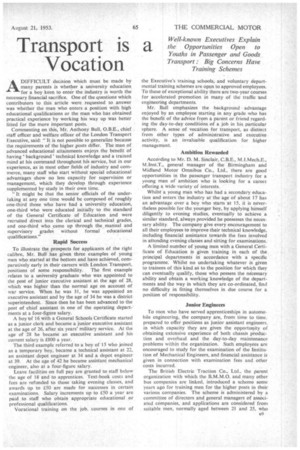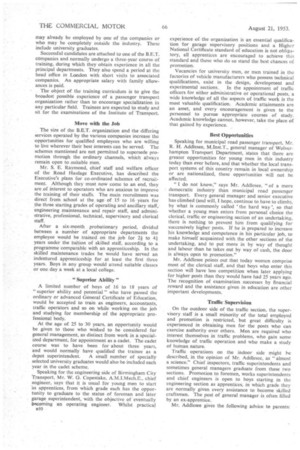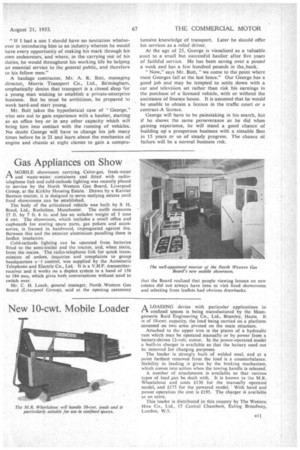Transport is a Vocation
Page 43

Page 44

Page 45

If you've noticed an error in this article please click here to report it so we can fix it.
A• DIFFICULT decision which must be made by many parents is whether a university education for a boy keen to enter the industry is worth the necessary financial sacrifice. One of the questions which contributors to this article were requested to answer was whether the man who enters ,a position with high educational qualifications or the man who has obtained practical experience by working his way up was better fitted for the more important posts.
Commenting on this, Mr. Anthony Bull, 0.B.E., chief staff officer and welfare officer of the London Transport Executive, said: "It is not possible to generalize because the requirements of the higher posts differ. The man of advanced educational attainments enjoys the benefit of having ' background' technical knowledge and a trained mind at his command throughout his service, but in our experience, as in most other fields of industry and commerce, many staff who start without special educational advantages show no less capacity for supervision or management, which they develop through experience supplemented by study in their own time.
"It might be that the senior officials of the undertaking at any one time would be composed of roughly one-third those who have had a university education, one-third who were educated initially to the standard of the General Certificate of Education and were recruited direct into the clerical and technical grades, and one-third who came up through the manual and supervisory grades without formal educational qualifications."
Rapid Success To illustrate the prospects for applicants of the right calibre, Mr. Bull has given three examples of young men who started at the bottom and have achieved, comparatively early in their careers with London Transport, positions of some responsibility. The first example relates to a university graduate who was appointed to the post of junior executive assistant at the age of 28, which was higher than the normal age on account of war service. When he was 31, he was appointed an executive assistant and by the age of 34 he was a district superintendent. Since then he has been advanced to the post of chief assistant in one of the operating depart-' ments at a four-figure salary.
A boy of 16 with a General Schools Certificate started as a junior clerk and became a junior executive assistant at the age of 26, after six years' military service. At the age of 28 he became an executive assistant and his current salary is £800 a year.
The third example referred to a boy of 15 who joined as a temporary boy, became a technical assistant at 22, an assistant depot engineer at 34 and a depot engineer at 39. At the age of 42 he became assistant mechanical engineer, also at a four-figure salary.
Leave facilities on full pay are granted to staff below the age of 18 and to apprentices. Text-book costs and fees are refunded to those taking evening classes, and awards up to £50 are made for successes in certain examinations. Salary increments up to £50 a year are paid to staff who obtain appropriate educational or professional qualifications. Vocational training on the job, courses in one of
the Executive's training schools, and voluntary departmental training schemes are open to approved employees. To those of exceptional ability there are two-year courses for accelerated promotion in many of the traffic .and engineering departments.
Mr. Bull emphasizes the background advantage enjoyed by an employee starting in any grade who has the benefit of the advice from a parent or friend regarding the day-to-day conditions of a job in his, particular sphere. A sense of vocation for transport, as distinct from Other types of administrative and executive activity, is an invaluable qualification for higher management.
Ambition Rewarded .
AccOrding to Mr. D. M. Sinclair, C.B.E., M.I.Mech.E., lvI.Inst,T., general manager of the Birmingham and Midland Motor Omnibus Co., Ltd., there are good opportunities in the passenger transport industry for a young man of ambition who is looking for a career offering a wide variety of interests.
Whilst a young min who has had a secondary education and enters the industry atthe age of about 17 has an advantage over a boy, who starts at 15, it is nevertheless possible for the younger boy, by applying himself diligently to evening studies, eventually to achieve a similar standard, always provided he possesses the necessary ability. The company give every encouragement to all their employees to improve their technical knowledge. including financial assistance towards the fees involved in attending evening classes and sitting for examinations.
A limited number of young men with a General Certificate of Education is given training in each of the principal departments iii accordance with a specific programme: Whilst no undertaking whatever is given to trainees of this kind as to the position for which they can eventually qualify, those who possess the necessary ability and obtain a working knowledge of the departments and the way in which they are co-ordinated, find no difficulty in fitting themselves in due course for a position of responsibility.
Junior Engineers To men who have served apprenticeships in automobile engineering, the company are, from time to time, prepared to offer positions as junior assistant engineers, in which capacity they are given the opportunity of obtaining extensive experience of both chassis production and overhaul and the day-to-day maintenance
problems within the organization. Such employees are encouraged to study for the examination of the Institu tion of Mechanical Engineers, and financial assistance is given in connection with examination fees and other costs incurred.
The British Electric Traction Co., Ltd., the parent organization with which the B.M.M.O. and many other bus companies are linked, introduced a scheme some years ago for training men for the higher posts in their various companies. The scheme is administered by a committee of directors and general managers of associated companies, and applications are considered from suitable men, normally aged between 21 and 25, who may already be employed by one of the companies or who may be completely outside the industry. These include university graduates.
Successful candidates are attached to one of the B.E.T. c-Ompanies and normally undergo a three-year course of training, during which they obtain experience in all the principal departments. They also spend a period at the head office in London with short visits to associated companies. An appropriate salary with family allowances is paid.
The object of the training curriculum is to give the broadest possible experience of a passenger transport organization rather than to encourage specialization in any particular field. Trainees are expected to study and sit for the examinations of the Institute of Transport.
Move with the Job The size of the B.E.T. organization and the differing services operated by the various companies increase the opportunities for qualified employees who are willing to live wherever their best interests can be served. The schemes mentioned are not permitted to supersede promotion through the ordinary channels, which always remain open to -suitable men.
Mr. S. E. Raymond, chief staff and welfare officer of the Road Haulage Executive, has described the Executive's plans for co-ordinated schemes of recruitment. Although they must now come to an end, they are of interest to operators who are anxious to improve the training of their staffs. The main recruitment was direct from school at the age of 15to 16 years for the three starting grades of operating and ancillary staff,. engineering maintenance and repair staff, and administrative, professional, technical, supervisory and clerical staff.
After a six-month probationary period, divided between a number of appropriate departments the employee would be trained on the job for 21 to years under the tuition of skilled staff, according to a programme comparable with an apprenticeship. In the skilled maintenance trades he would have served an indentured apprenticeship for at least the first three years. Boys in any group would attend suitable classes or one day a week at a local college.
"Superior Ability" A limited number of boys of 16 to 18 years of "superior ability and potential" who have passed the ordinary or advanced General Certificate of Education, would be accepted to train as engineers, accountants, traffic operators and so on while working on the job and studying for membership of the appropriate pro. fessional body.
At the age of 25 to 30 years, an opportunity would be given to those who wished to be considered for general management, as distinct from work in a specialized department, for appointment as a cadet. The cadet course was to have been for about three years, and would normally have qualified the trainee as a
depot superintendent. A small number of specially selected university graduates would also-be included each year in the cadet scheme.
Speaking for the engineering side of Birmingham City transport, Mr. W. G. Copestake, A.M.I.Mech.E., chief engineer, says that it is usual for young men to start as apprentices, from which grade each has the opportunity to graduate to the status of foreman and later garage superintendent, with the objective of eventually becoming an operating engineer. Whilst practical el 0 experience of the organization is an essential qualification for garage supervisory positions and a Higher National Certificate standard of education is not obligatory, all apprentices are encouraged to achieve this standard and those who do so stand the best chances of promotion.
Vacancies for university men, or men trained in the factories of vehicle manufacturers who possess technical qualifications, exist in the design, development and experimental sections.. In the appointment of traffic officers for either administrative or operational posts, a wide knowledge of all the aspects of traffic work is the most valuable qualification. Academic attainments are an asset, and every encouragement is given to the personnel to pursue appropriate courses of study. Academic knowledge cannot, however, take the place of that gained by experience.
Best Opportunities Speaking for municipal road passenger transport, Mr. R. H. Addlesee, M.Inst.T., general manager of Wolverhampton Transport Department, states that there arc greater opportunities for young men in this industry today than ever before, and that whether the local transport systems of this country remain in local ownership or are nationalized, these opportunities will not be affected.
"I do not know," says Mr. Addlesee, "of a more democratic industry than municipal road passenger transport. Every general manager and senior executive has climbed (and will, I hope, continue to have to climb). by what is commonly called 'the hard way ', so that whether a young man enters from personal choice the clerical, traffic or engineering section of an undertaking, there is nothing to prevent him from qualifying for successively higher posts. If he is prepared to increase his knowledge and competence in his particular job, to make himself acquainted with the other sections of the undertaking, and to put more in by way of thought and labour than he takes out by way of cash, the door is always open to promotion."
MT_ Addlesee points out that today women comprise most of the clerical staff, and that boys who enter this section will have less competition when later applying for higher posts than they would have had 25 years ago. The recognition of examination successes by financial reward and the assistance given in education are other important developments.
Traffic Supervision On the outdoor side of the traffic section, the supervisory staff is a small minority of the total employed and promotion is restricted, but great difficulty is experienced in obtaining men for the posts who can exercise authority over others. Men are required who interest themselves in traffic problems, who gain some knowledge of traffic operation and who make a study of human nature.
Traffic operations on the indoor side might be described, in the opinion of Mr. Addlesee, as "almost a science." Chief inspectors, traffic superintendents and sometimes general managers graduate from these two sections. Promotion to foremen, works superintendents and chief engineers is open to boys starting in the engineering section as apprentices, in which grade they are normally given every assistance to become skilled craftsmen. The post of general manager is often filled by an ex-apprentice.
Mr. Addlesee gives the following advice to parents:
" If I had a son I should have no hesitation whatsoever in introducing him to an industry wherein he would. have every opportunity of making his mark through his own endeavours, and where, in the carrying out of his duties, he would throughout his working Fife be helping an essential service to the general public, and therefore Lo his fellow men."
A haulage contractor, Mr, A. R. Butt, managing director, Morris Transport Co., Ltd., Birmingham, emphatically denies that transport is a closed shop for a young man wishing to establish a private-enterprise business. But he must be ambitious, be prepared to work hard-and start young.
Mr. Butt takes the hypothetical case of " George,'' who sets out to gain experience with a haulier, starting as an office boy or in any other capacity which will bring him into contact with the running of vehicles. No doubt George will have to change his job many times before he is 21 and learn about the mechanics of engine and chassis at night classes to gain a compre
hensive knowledge of transport. Later he should offer his services as a relief driver.
At the age of 25, George is visualized as a valuable asset to a small but successful haulier after five years of faithful service. He has been saving over a pound a week and has a few hundred pounds in the,bank.
" Now," says Mr. Butt, "we come to the point where most Georges fall at the last fence." Our George has a good job and may be tempted to settle down with a car and television set rather than risk his earnings in the purchase of a licensed vehicle, with or without the assistance of finance house. It is assumed that he would be unable to obtain a licence in the traffic court or a contract-A licence.




























































































